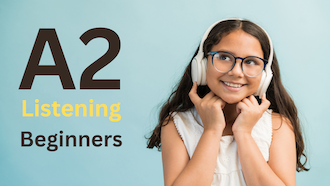
Adverbs of Manner
Watch four videos using adverbs of manner in conversation.
Conversation 1 | PDF Worksheet
Man: How was the movie?
Woman: Terrible. There were some rude people sitting right behind us.
Man: Really? How were they rude?
Woman: Well, they talked loudly during the whole movie.
Man: Oh, that is terrible. I hate that.
Woman: Yeah, I kept looking at them angrily, but they didn't seem to notice.
Man: I'm sorry to hear that. I would have said something.
Woman: Yeah, I should have.
Conversation 2 | PDF Worksheet
Man: How was your English test?
Woman: It went pretty smoothly. I answered most questions quite easily.
Man: That's great. Sounds like you aced it.
Woman: Well, I wouldn't go that far.
Man: Why not? You said you it was easy.
Woman: Well, I felt confidently about my last test, and I got a C.
Man: Well, I'm sure things will turn out differently this time.
Woman: Let's hope so!
Conversation 3 | PDF Worksheet
Man: What are you doing?
Woman: I'm using this app to learn French.
Man: Oh, cool. Is it working?
Woman: Yeah, I'm learning a lot of words quickly.
Man: Does the app teach grammar?
Woman: No, it mostly only teaches vocabulary.
Conversation 4 | PDF Worksheet
Man: How did your job interview go?
Woman: Not well. It didn't go smoothly.
Man: Why? What happened?
Woman: Well, when they asked me questions, I couldn't think of anything to say.
Man: Oh, no. What did you do?
Woman: Nothing! I just sat there quietly!
Man: Don't worry about it. I'm sure that happens all the time.
Woman: Yeah, maybe it was not meant to be.
Man: Maybe not, but you never know.
Adverbs of Manner – How Actions Happen
Adverbs of manner describe *how* something is done. They often end in -ly and make sentences more descriptive. These adverbs are common in both writing and speech. Below are some key grammar points about how adverbs of manner work in English.
To form an adverb of manner, you usually take an adjective and add -ly.
- loud → loudly
- angry → angrily
- quick → quickly
- confident → confidently
This is the most common position. The adverb comes right after the verb.
- They talked loudly during the whole movie.
- I answered most questions quite easily.
- I just sat there quietly.
Sometimes the adverb comes after both the verb and its object.
- I kept looking at them angrily.
- I learned new words quickly.
When a sentence uses an auxiliary verb (like have, will, can, or be), the adverb can go between the auxiliary and the main verb.
- I was able to confidently answer the last question.
- He has easily passed all of his exams.
- I might quickly review it later.
This word order is less common and usually used in writing or formal speech to add emphasis.
- Quickly, she brought all the chilren inside.
- Quietly, the student snuck out of class.
- Angrily, she told me to stop talking.
Adverbs of manner almost never go between a verb and its direct object. This word order is incorrect in most cases.
- ❌ I learned quickly new words. → Not correct
- ✅ I learned new words quickly. → Correct
- ❌ She answered confidently the questions. → Not correct
- ✅ She answered the questions confidently. → Correct











